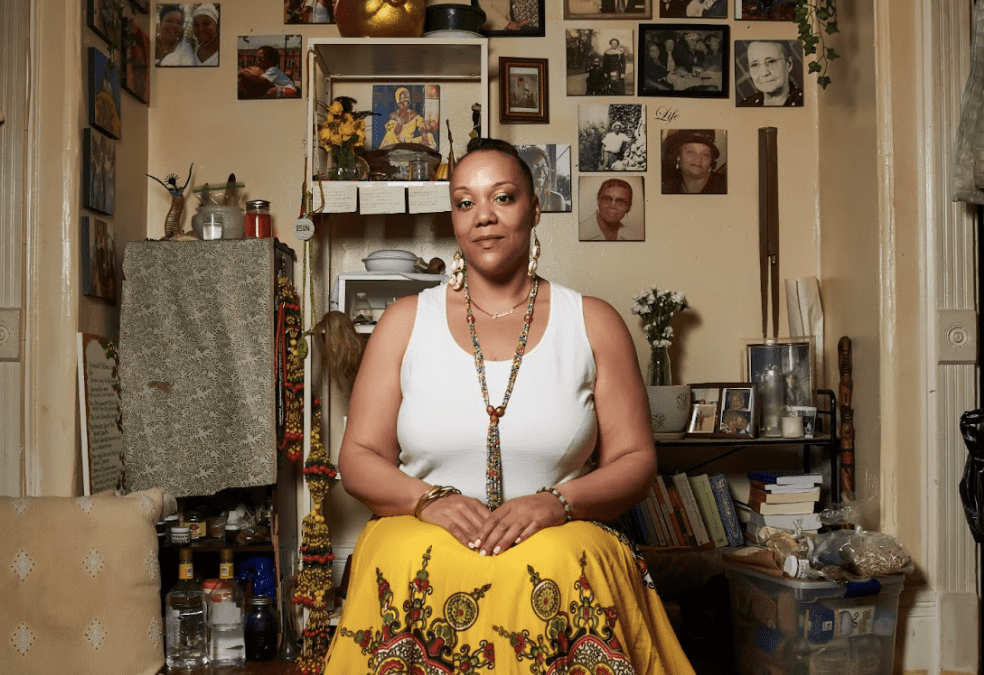For the past two years, most of the world’s population has been forced to barricade themselves inside in the name of public health and safety. And unfortunately, as a result, issues dealing with mental health like anxiety and depression were on the rise. In that time, liquor sales increased across America as people turned to a proper bottle of hooch to cope. But alcohol wasn’t the only substance in the market on the rise. Marijuana use skyrocketed, and subsequently, so did its sales. Why? Because according to mental health professional and Oshun Priestess Kendall Johnson-Smith, LMSW, marijuana isn’t just a drug, it’s a medicinal remedy that can be used to help people “work [their] sh-t out.â€
Johnson-Smith is a highly skilled counselor, healer, and life coach whose focus is to help people “align with their highest destiny.†She currently runs a middle school mental health program in Brooklyn, providing counseling services for kids in the school community. And when the guru of mind, body, and soul isn’t working with BK’s youth, she works with adults to aid them in developing strategies for emotional regulation and healthy ways to respond to trauma—including indulging in a little weed from time to time. As a licensed master social worker, Johnson-Smith does not offer or prescribe marijuana, she’ll listen to those who are interested in understanding its mental effects and explain the benefits of use if someone so chooses. And in certain instances, the spiritual priestess finds that her background deepens her connection with certain patients who grew up using weed as a coping mechanism, similar to the way Christians turn to church to cope with the trauma in their lives.
So sit back, breath in, close eyes, and imagine how it feels to puff with perspective.
As a mental health professional, do you recommend marijuana as a go-to form of treatment for your clients?
I don’t offer it. I definitely ask and assess how people are coping with what’s going on, and I make sure that I have no judgment. That’s the most important thing—so that they’re not experiencing any shame or vulnerability. [I get] a really honest idea about [if and] how they are indulging in it and [if they’re] using it as a coping strategy or form of improvement of health.
Can you tell if people are being dishonest about their use?
[When it comes to my client’s use], I really try to take people for what they say. It’s not my job to pass judgment. My concern is helping you.
Do client’s ever ask to integrate marijuana into their therapy?
I haven’t had anybody approached me with that, but if they were to, I would assess their capacity to cope and become…curious. There [are] a lot of things that go into why a person would want to [use as an] adult. I would ask a lot of questions, be mindful of the coping, and go from there.
Do you think there is still a stigma around the medicinal use of marijuana?
Marijuana is hard. Marijuana is a gateway drug. Marijuana can cause depression. All of those things are really asking about a person’s ability to f-cking cope. That’s where I think the fear and the risk comes from society.

I think the hardest thing is a couple of things. It’s the shame around whatever it is that you’re dealing with. It’s [about] one’s capacity to be vulnerable but feel safe enough to actually see. I also notice…people think that there’s a set way to do therapy and that they’re doing it wrong, and I’m just like, No, that’s not. That’s not true. It’s something that we don’t talk about often enough., so it’s not normalized.
Does the conversation around an “abnormal†topic affect access for those seeking the proper treatment?
Oh, let me be clear about that. The quality of health[care] you’re getting is important or can make it hard. When you have a sh-tty therapist or someone you’re talking to and it’s not really benefiting you, it’s like, Well, what the fuck is the point?
So finding the right mental health professional truly makes a difference.
It’s like finding the [right] PCP [primary care physician]…because it’s such vulnerable stuff that it’s right. If it doesn’t work the first time, [try again].
Do you think the fact that athletes and other celebrities becoming more outspoken about their own personal issues is helpful in pushing the conversation forward or taking away?
Obviously, it depends on how they talk about it and what it is that they’re trying to [say]. But, in general, it’s important because we have to be able to name it in order to talk about it. We have to be able to name it in order to be able to work with it. Black people, especially, are walking around with a lot of nameless [issues] that are not being validated by the outside world. So we [have] to talk about it—even in our small little circles or pockets where you feel safe. We’ve got to shed.
I appreciate celebrities bringing things to light and using their platform to do so [by] normalizing the fact that things happen, and you need to go talk to somebody. [Sometimes] you [just] might need a little chemical reset.
What are the benefits of a chemical reset?
If it’s weed, [if it’s] a psychedelic…there [are] a lot of people who are working with those in order to facilitate certain reflections, go back to [a] healing place, or to access information that was trapped during [a] traumatic experience. You don’t necessarily want to go back to therapy and talk about it week in and week out. And that’s what I dig about it—herbal and natural assistance can get to the things a lot quicker.
What are the benefits of using marijuana as it relates to mental health?
Whether [its] being very creative or being able to get outside yourself, it’s a way of activating the body. If you are often in your head about things, we need to access the body for that information. I [find] weed help[s] people get into that body space. We walk with so much knowledge and wisdom of how to be well, but life f-ck[s] us up and we forget.

If you are a human being that is living and breathing on this good earth, you need therapy. Everybody should consider it. And it’s not something that is only there when something’s wrong.
What would you say is the overall benefit of going to therapy?
The overall benefit of therapy is having a non-judgmental, safe space to work your sh-t out.

